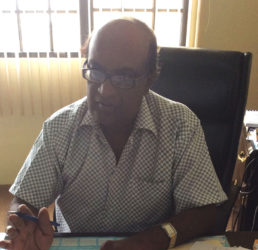Contributing to the further consolidating of the country’s food security status and better positioning of the agricultural sector to take advantage of international markets are high on the list of priorities of the National Agricultural Research and Extension Institute (NAREI).
And Chief Executive Officer of NAREI Dr Oudho Homenauth said that the country’s agricultural sector is “in a good place.”
Even as he frowned on the fact that the statistical competence to provide overwhelming evidence of the recent laudable performance of the country’s agricultural sector was lacking, he insists that there is every indication that the year ahead is likely to be a good one for the sector. “My particular regret is that for the moment we are lacking in proper data to make an analytical assessment of this assertion but we are in a good place. The weather has been good to us and the farmers have been responding to the support that they have been receiving from the institute,” Homenauth said.

While the loss of the Venezuelan rice market has led to speculation about replacements, Homenauth sounded an upbeat note about the immediate future of rice production, asserting the yield for the current crop could reach 60 bags per acre.
Meanwhile, Homenauth said NAREI’s food security focus was taking it in the direction of more collaborative efforts with local and external organizations to place attention on hinterland and rural agricultural projects. Homenauth disclosed that NAREI was in the process of creating a new support station in Region Nine in the Manari which it hoped would serve as a model for investors. The station is expected to become operational next year. Detailed agricultural plans are also in the process of being rolled out for Regions Seven and Eight.
Food security imperatives and a focus on increasing export earnings from the sector are also taking NAREI in the direction of collaborative initiatives with other entities to cultivate crops considered to be in high demand on the international market. In this regard, Homenauth said, NAREI was currently collaborating with the Institute of Applied Science and Technology (IAST) in the production of sun-dried tomatoes. “We have about fifty farmers involved in the project and NAREI is contributing the agronomy aspect of the project while the IAST is dealing with the drying,” he said.
Sun-dried tomatoes, ripened tomatoes that are then left to lose most of their water content, are in high demand on the international market on account of the fact that they can be used in a wide variety of recipes.
NAREI, meanwhile, is giving support to a private farming initiative at Paramakatoi which, while still in its experimental stage, “could turn out to be a significant economic venture,” Homenauth told Stabroek Business.
Other hinterland model farms intended to induce an acceleration of private investment in agriculture are being created at Kato in the North Pakaraimas and Hosororo while an existing orchard at Ebini is being expanded by 10 acres to 25 acres.
And according to Homenauth the efforts of local agencies and international organizations directly involved in agriculture are being supported by the work of the National Drainage and Irrigation Authority (NDIA) to create a road network that would see a more efficient link between the coast and the interior “in an effort to encourage more private sector investment in hinterland agriculture.”
Homenauth told Stabroek Business that engagements with potential investors had pointed to an enhanced interest in pursuing agriculture as an economic activity. He said that in the context of moving to reduce even further the volume of food imports NAREI was supporting projects designed to produce non-traditional crops like carrots, broccoli and cauliflower for the local and export markets. Asked whether NAREI was satisfied with the responsiveness of the local agricultural community to the institute’s efforts to continue to apply science in pursuit of the advancement of farming techniques and the realization of higher yield, Homenauth said the positive returns which collaboration between NAREI and the agricultural sector had yielded, had resulted in a growth of confidence in the entity. “The technology is there and it is being absorbed,” Homenauth said.
Part of the focus of NAREI’s support for more efficient and effective agricultural practices in the hinterland region is to “empower communities to enable them to supply commodities for local school-feeding programmes,” Homenauth said.









